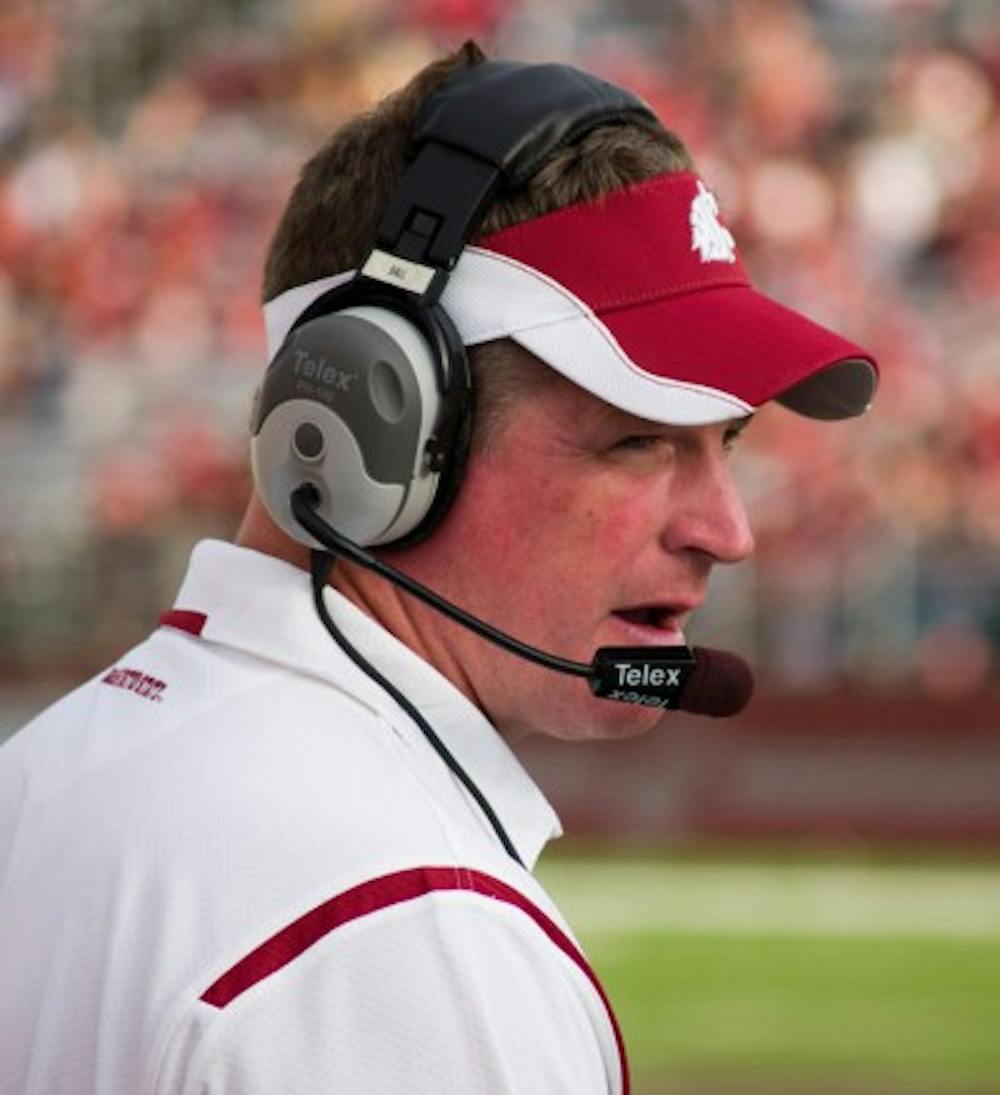As the Sun Devils continue to rebuild their football program, new faces continue to emerge.
When coach Todd Graham was hired, he faced the challenge of putting together a new coaching staff in a short amount of time.
Chris Ball, who spent the past three seasons at Washington State as an assistant head coach, co-defensive coordinator and safeties coach, is one of the newest additions to the ASU coaching staff and will coach the secondary.
The State Press had a chance to sit down with Ball and talk about his plans for the future of ASU football.
The State Press: What got you starting in coaching, and when did you decide you wanted to coach football?
Chris Ball: That’s all I’ve ever wanted to do. My dad (Jack) was a coach, a head high school coach at Parkway Central High School in St. Louis. (He) then became the head football coach at Northeast Missouri State (now Truman State University). He did that for eight years, so it’s all I ever wanted to do too.
The minute I got done playing at Missouri Western, I started coaching that spring.
SP: What do you get out of coaching? What’s the most enjoyable aspect?
CB: The best thing is that I get a chance to help young people achieve their goals. That’s the best thing about it. I get to make a difference in a young person’s life.
SP: What brings you to ASU and Tempe? At this point in your career, why was this job so attractive?
CB: Coaching in this league for nine years, I’ve always thought this was one of the best, if not the best, jobs. The location and facilities (make it so) you can go anywhere in the country and get a kid to come here. We’ve got a good recruiting base with the local, in-state talent. We’re close to southern California, close to Texas. There are just so many positives about this place. I think it’s one of those places you can win a national championship at.
SP: You mention recruiting and local talent, but ASU has struggled with that in the past. What are the keys to getting the Arizona kids to stay in Arizona?
CB: You’ve got to recruit. You’ve got to make it a priority. Make it a priority and then recruit them. You need to check in your backyard first and then branch out. There’s no sense of going to California when you can get the same kid here in Phoenix or here in Arizona. I think you’ve got to make it a priority to recruit locally.
SP: You guys obviously got a late start because of the coaching change. Knowing you guys had to fast forward everything, how has recruiting been going?
CB: We had to build relationships fast. You’ve got a small window to see everybody. We’ve got to take advantage of every minute of the day that we can be out on the road and getting in everybody’s homes. I’ve spent a lot of time on the phone, developing relationships and talking to these kids. As much as the rules permit, we’ve got to be out there seeing these kids until the next dead period.
It’s been a scramble, but that’s normally the case when you take a job. I wasn’t hired until Dec. 15, and there were only four of us, so the first week, we only had four guys. That made it tough.
It’s been a whirlwind, but it’s OK. We’ve got some kids that are interested and we’ve got a great staff that knows how to recruit. We’ve got a head coach that understands the importance of recruiting and does a great job at it.
SP: Speaking of the head coach, Todd Graham talks a lot about discipline and the culture of ASU. What are your thoughts on Graham so far?
CB: Great. I’ve always liked him, and (I’ve) known him for a long time. He has a vision. He has a plan and he believes in recruiting and hiring good character people as well as being disciplined. I think those are things you’ve got to have to be successful.
SP: Discipline is the word that’s being used over and over again. You’ve been a part of the Pac-10 and the Pac-12. It’s no secret this team struggles with penalties, what can be done to reverse that culture and make discipline more than just a word?
CB: You’ve got to live it on and off the field. It’s got to be part of your day. It can’t be part time. It’s got to be full time. I think that’s what we’re trying to instill in the guys right now. We’ve got to change the culture and the way to do that is come in here and ask the kids to do things they’re not used to doing and follow up with them. We can’t let anything slide. It starts at the top, and I think coach Graham’s got a good handle on it.
SP: It’s only been a brief time, but how do the kids seem to be adjusting to that new philosophy?
CB: I think they’re doing great - way better than I expected. We’ve got a great group of kids here and they want to win and be successful. They understand the importance of discipline and they’re trying really hard to do everything the coaches are asking them to do.
SP: After meeting the kids and competing against them last year, what do you expect from them in 2012 and beyond?
CB: I expect us to win and win big. I do not expect next year to be a rebuilding year. We want to go out there and compete for the conference championship, play in the Rose Bowl and win a national championship.
We do not want to count next year as a rebuilding year. We want to win.
Reach the reporter at william.boor@asu.edu





